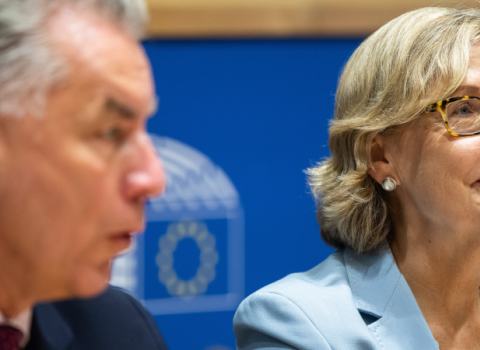The creation of the European Health Data Space is in the balance, with talks between the Parliament and Council set to continue on Thursday, in a bid to agree a deal before the EU elections

MEP Patrick Breyer, one of the European Parliament's negotiators in the creation of a European Health Data Space (EHDS). Photo: Fred Marvaux / European Union
EU negotiators are due to return to the table on Thursday in a final attempt to reach an agreement on the European Health Data Space (EHDS) before this summer’s European elections.
The proposed legislation aims to improve individuals’ access to their health data and would facilitate cross-border sharing of health data and its use in research and policymaking.
The latest round of talks between the Parliament and the Council last Thursday ended at 4am on Friday morning without a deal. The main stumbling block relates to patients’ right to opt out of sharing their data for so-called secondary uses, which includes research and innovation.
MEPs want to give individuals the possibility to opt out, which was not included in the original proposal from the Commission.
A counter-proposal from the Council would add exceptions to the opt-out mechanism, when they are in the public interest, notably for public authorities undertaking public health research. The ultimate decision would then fall to member states.
The EPP and S&D groups were ready to accept this condition, but were unable to find a majority, according to a parliamentary representative, who believes a deal may have been possible had Renew group MEPs been present. They were instead represented by advisers and assistants who were unable to budge from their position.
But other groups have warned that failing to include a strict requirement for consent would mean putting profit over the interests of patients.
“This could mean the end of medical confidentiality and deter patients from seeking urgently needed treatments for fear of stigmatisation, possibly even resulting in suicides,” said green MEP Patrick Breyer, one of Parliament’s negotiators.
Burden on hospitals
The EHDS has the potential to open up large amounts of (anonymised) health data for researchers. “It could lead to an enormous improvement in the way in which we deliver healthcare, not only in terms of finding new treatments, new diagnostics, but also in making current treatments more efficient,” said Johan Van Eldere, secretary general of the European University Hospital Alliance (EUHA).
The EUHA is opposed to including an opt-out mechanism. “For us data holders, it’s an enormous additional burden, both administratively and also financially, in terms of setting up the system,” Van Eldere said. If it is put in place, patients should only be given the chance to opt out at the start, not at any moment, he added.
Whatever is decided could also impact the quality of data. “Opt-out would I believe be more frequent in certain populations, which would lead to a bias, which in the end will also be detrimental to a lot of algorithms or artificial intelligence developed on the basis of those data,” said Van Eldere.
Multiple stakeholder groups have warned of the “substantial” risk of data bias. They cite the complexity of including certain populations, “including ethnic and deprived groups”, in member states’ data, and warn that many healthy individuals have “little interest in actively providing their information”.
Harmonisation
Harmonisation across all member states is also critical. Currently, Van Eldere says, a lack of clarity and differing interpretations of GDPR and the Medical Device Regulation are pushing many researchers to abandon work on new medical devices, while biotech and medtech firms are moving oversees.
Healthcare innovation companies are worried that if certain member states adopt stricter regulations than others, this will hinder research projects, particularly those which require cross-border collaboration and data sharing.
“Diverging conditions at the member state level could lead to fragmentation and disrupt harmonisation efforts,” said Philipp Goedecker, digital health senior manager at COCIR, an association representing the medical imaging, radiotherapy, and health ICT industries.
In February, 35 health stakeholder organisations expressed concern that a number of issues remained unresolved during negotiations. They said the EHDS should harmonise rules, clarify its interaction with other legal frameworks including the General Data Protection Regulation (GDPR), and avoid excessive data localisation restrictions.
Intellectual property (IP) protection is also not sufficiently addressed in the existing proposal, which “could hamper the EU’s ability to compete globally”, Goedecker said.
“Granting access to electronic health data subject to IP rights or containing trade secrets without adequate control and safeguards for data holders would undermine existing legal protections and incentives crucial for researchers and innovators,” he told Science|Business.
The scope of electronic health data categories to be made available for secondary use also needs to be clarified, said Alexander Olbrechts, director for digital health at trade association MedTech Europe.
The current broad definitions of data types could lead to ambiguity and “could potentially also entail device-generated data in the scope of the EHDS,” Olbrechts said. Including large amounts of data that is automatically generated by connected medical devices could make it more difficult to draw meaningful conclusions.
Industry and research bodies are urging decision-makers to take the time to iron out the remaining issues rather than rush through the text.
Once it is enacted, it will be several years before it is fully operational. The Council wants to allow five to seven years for registering data after a two-year implementation period, but the Parliament has been pushing for a shorter transition.
Van Eldere says an extended and flexible transition period is required, as until recently, hospitals were not used to dealing with regulation at a European level. “We need time to set up and to acquire the expertise that is needed,” he said.





 A unique international forum for public research organisations and companies to connect their external engagement with strategic interests around their R&D system.
A unique international forum for public research organisations and companies to connect their external engagement with strategic interests around their R&D system.